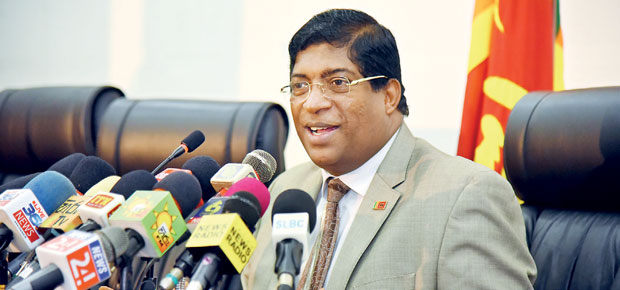16 Mar 2017 - {{hitsCtrl.values.hits}}

By Chandeepa Wettasinghe
The third tranche of the International Monetary Fund’s (IMF) US $ 1.5 billion Extended Fund Facility (EFF) would not be delayed in mid-2017 despite Sri Lanka’s inability to meet the foreign reserve targets set by the programme, the country’s Finance Minister Ravi Karunanayake told reporters in Colombo, yesterday.
“No, I don’t think so, not at all. If you look, 90 percent of the (IMF) statement commends Sri Lanka for bringing the economy under very controllable limits in a very difficult year under an extensive fiscal policy success story,” he said in reply to a question raised by a reporter whether the tranche
would be delayed.
Through higher revenue collection and expenditure cuts, the budget deficit for 2016 was reduced to 5.6 percent of the gross domestic product (GDP) slightly off the 5.4 percent. The budget deficit in 2015 hit 7.4 percent of GDP largely due to a massive fuel price cut and an unsustainable public sector salary hike.
Karunanayake said the only target not achieved in relation to the EFF was the net international reserves (NIR) and added that the reserves position would be rectified through a realignment but refused to share further details of such an exercise.
“Those will be rectified. We believe that the reserves are coming back. President Trump’s activities are certainly affecting emerging markets, as you know. We need to get this realignment. Yellen (US Fed Chair) will likely increase rates today so all these are drawing money out of countries like us,” Karunanayake remarked.
The key activities to create reserve buffers such as the sale of the Hambantota port for US $ 1.12 billion and the sale of non-strategic state-owned enterprises (SOE) for US $ 1 billion have been delayed due to public opposition and litigation snags.
“We’re currently doing the valuations,” Katunayake said in reference to the SOEs.
Leading economists recently told Mirror Business that the country’s reserves are unlikely to increase without debt or asset sales. Foreign direct investment (FDI) to Sri Lanka last year was a dismal US $ 400 million and the country’s export earnings have been on the decline.
Despite his realignment plan for foreign reserves, Karunanayake said that the NIR target for June is also unlikely to be met.
“All targets are on, except NIR,” he said when asked how the country will comply with the June targets of the EFF.
Despite Karunanayake’s exuberance, Sri Lanka failed to meet the December 2016 deadline for both the signing of Statements of Corporate Intents (SCIs) for the largest SOEs—which were only signed yesterday—and the introduction of automated formulae for electricity and fuel pricing.
“We did one (formula), but we were not satisfied with it. So we are getting some professional help locally from the PUCSL (Public Utilities Commission of Sri Lanka) and from India and other foreign countries to get us a durable policy,” he said.
According to the EFF agreement, Ceylon Petroleum Corporation (CPC) and the Ceylon Electricity Board (CEB) are required to have formulae that will allow them to recover costs according to the changes in the international energy markets.
A formula also supposed to be applied for water once the PUCSL starts regulating that segment as well.
However, the prices are currently fixed by the government, which recently refused to allow a 5 percent increase in electricity prices for the CEB to reduce losses. The government said that the consumer cannot be burdened.
“The CEB made profits last year. This year there are losses due to the drought. But just because there were losses one year doesn’t mean that we should place the burden on the people. We want to find a systematic solution to this,” he said.
26 Nov 2024 10 minute ago
26 Nov 2024 1 hours ago
26 Nov 2024 2 hours ago
26 Nov 2024 2 hours ago
26 Nov 2024 2 hours ago